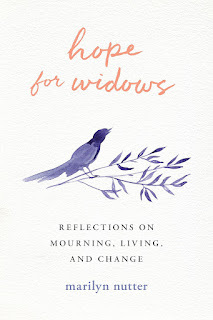How Personal Journal Entries Can Spark Ideas for Publication
Edie here. Today I'm thrilled to introduce you to an author who is a dear friend of mine. I've been praying for her latest book, Hope for Widows: Reflections on Mourning, Living, and Change, for a long time. It recently hit store shelves and I'm thrilled to have her share a guest post and give you the link to her book below. Give her a warm TWC welcome!

How Personal Journal Entries Can Spark Ideas for Publicationby Marilyn Nutter @MarilynNutter
A lot happens at a writing conference. Sometimes we have “aha” moments during a keynote or worship. We learn through workshops and classes. We pray for an appointment with an editor who we hope will respond to our one sheet. But sometimes, meaningful moments surface over a meal in the dining hall.
I had re-entered the writing world, attending a conference, after a break following the death of my husband. As my friend and I chatted over dinner, she asked what my current work in progress was.
“That’s why I’m here—to figure my next steps. So far, I’ve only written in my daily journals.”
“Have you considered writing articles from what you’re learning?”
“I record my personal thoughts and grief journey,” I answered. “I’m not sure anyone wants to hear another widow story.”
“But you are unique and can help someone else.”
Those powerful words served as a turning point, an “aha” moment, that set me on a course of using my struggles to help someone. Out of my personal journals and experiences, came articles, blog posts, and two books.
Perhaps you are thinking the same. How can my experience help someone? I’ll share with you my process and the questions I thought were essential to answer when I attempted to follow my friend’s encouragement to write for publication.
Questions to Help Us Write About Personal ExperiencesIdentify your experience. Did it result from a death, divorce, illness, betrayal of a friend, financial reversal? Who is the target audience waiting for your message? Examine your thoughts and emotions. Are you puzzled, blindsided, concerned, angry?How are you managing to process thoughts? Are you seeking outside help? Are you finding wisdom and comfort in Scripture?What are you learning about yourself? Have you made discoveries about people, circumstances, and situations in your story?Who is God in this experience? What is He teaching you? Have you found a scriptural theme? Have you found a predominant scripture that is guiding you?What can you show your reader about your experience that would be helpful?Can I be transparent without compromising confidentiality, remembering that this is my story, not naming other people in it, unless it is something positive? What’s my goal? How can my experience benefit others? Do I want to give information, insight, a new perspective? How can I offer encouragement to show readers they aren’t alone? Will my words be life giving to readers? Will they have a personal take away? After I returned home I prayed and reviewed my journals. In turning my pages, I was reminded how in my grief and loss, I met and knew God in new ways. I had grown and learned new things about myself and others who reached out in support—and those who didn’t. I didn’t approach writing about loss as a counselor or even attempting to fix a problem. My goal was to link arms with readers in support for their healing path.
The words “You can help someone” changed me and my writing. What about you? Have your recorded your path in a life changing experience in your journals? How have you seen God work in and through it? How do you think you can use it—how can God use it—to help someone?
TWEETABLEHow Personal Journal Entries Can Spark Ideas for Publication from author @MarilynNutter on @EdieMelson (Click to Tweet)
 Hope for Widows: Reflections on Mourning, Living, and Changeby Marilyn Nutter
Hope for Widows: Reflections on Mourning, Living, and Changeby Marilyn Nutter
Hope for Widows is a valuable source of encouragement and comfort as you adjust to your new normal and reimagine an active life with purpose in your future. With personal reflections, questions, and expressions of gratitude, join Marilyn Nutter in recognizing God’s faithful presence in details and unusual places.
Having lost her husband of 42 years, Marilyn offers 65 brief readings that cover widows’ universal experiences with empathy and poignant honesty. She applies Scripture to grief and mourning and looks with transparency at how widowhood dramatically changes a woman’s life. Amid the readings are opportunities to journal treasured memories, reflect on the additional losses that accompany the death of a spouse, and appreciate unexpected gifts.
This book presents the truth of Scripture to combat lies you may be prone to believe in your newly single life, shares quotes related to loss, offers prayers from the Bible, and provides exercises to build trust by looking at the character of God from A to Z. Read this book on your own or find topics helpful for discussion in women’s ministries or grief support groups.
Though nothing can fix this irreversible loss, Hope for Widows offers connections in your grief, guiding you to see hope, grace, and camaraderie on an unfamiliar path.
 Marilyn Nutter loves finding treasures in unexpected places: gratitude in mulch, conversations with grandchildren, and old family recipes. Most of all she has found the treasure of hope in loss. Unexpectedly widowed after forty-two years of marriage, Lamentations 3:22-23 has been a brilliant treasure. Reflections from her journals and life experience since the sudden death of her husband, developed into articles, blogs, and two books. One is an award winning book with April White, Destination Hope: A Travel Companion When Life Falls Apart. Her newest book, Hope for Widows: Reflections on Mourning, Living, and Change will be released in January 2024 and is up for pre-order on Amazon. Connect with Marilyn at marilynnutter.com and read about weaving hope and purpose in your life stories.
Marilyn Nutter loves finding treasures in unexpected places: gratitude in mulch, conversations with grandchildren, and old family recipes. Most of all she has found the treasure of hope in loss. Unexpectedly widowed after forty-two years of marriage, Lamentations 3:22-23 has been a brilliant treasure. Reflections from her journals and life experience since the sudden death of her husband, developed into articles, blogs, and two books. One is an award winning book with April White, Destination Hope: A Travel Companion When Life Falls Apart. Her newest book, Hope for Widows: Reflections on Mourning, Living, and Change will be released in January 2024 and is up for pre-order on Amazon. Connect with Marilyn at marilynnutter.com and read about weaving hope and purpose in your life stories.

How Personal Journal Entries Can Spark Ideas for Publicationby Marilyn Nutter @MarilynNutter
A lot happens at a writing conference. Sometimes we have “aha” moments during a keynote or worship. We learn through workshops and classes. We pray for an appointment with an editor who we hope will respond to our one sheet. But sometimes, meaningful moments surface over a meal in the dining hall.
I had re-entered the writing world, attending a conference, after a break following the death of my husband. As my friend and I chatted over dinner, she asked what my current work in progress was.
“That’s why I’m here—to figure my next steps. So far, I’ve only written in my daily journals.”
“Have you considered writing articles from what you’re learning?”
“I record my personal thoughts and grief journey,” I answered. “I’m not sure anyone wants to hear another widow story.”
“But you are unique and can help someone else.”
Those powerful words served as a turning point, an “aha” moment, that set me on a course of using my struggles to help someone. Out of my personal journals and experiences, came articles, blog posts, and two books.
Perhaps you are thinking the same. How can my experience help someone? I’ll share with you my process and the questions I thought were essential to answer when I attempted to follow my friend’s encouragement to write for publication.
Questions to Help Us Write About Personal ExperiencesIdentify your experience. Did it result from a death, divorce, illness, betrayal of a friend, financial reversal? Who is the target audience waiting for your message? Examine your thoughts and emotions. Are you puzzled, blindsided, concerned, angry?How are you managing to process thoughts? Are you seeking outside help? Are you finding wisdom and comfort in Scripture?What are you learning about yourself? Have you made discoveries about people, circumstances, and situations in your story?Who is God in this experience? What is He teaching you? Have you found a scriptural theme? Have you found a predominant scripture that is guiding you?What can you show your reader about your experience that would be helpful?Can I be transparent without compromising confidentiality, remembering that this is my story, not naming other people in it, unless it is something positive? What’s my goal? How can my experience benefit others? Do I want to give information, insight, a new perspective? How can I offer encouragement to show readers they aren’t alone? Will my words be life giving to readers? Will they have a personal take away? After I returned home I prayed and reviewed my journals. In turning my pages, I was reminded how in my grief and loss, I met and knew God in new ways. I had grown and learned new things about myself and others who reached out in support—and those who didn’t. I didn’t approach writing about loss as a counselor or even attempting to fix a problem. My goal was to link arms with readers in support for their healing path.
The words “You can help someone” changed me and my writing. What about you? Have your recorded your path in a life changing experience in your journals? How have you seen God work in and through it? How do you think you can use it—how can God use it—to help someone?
TWEETABLEHow Personal Journal Entries Can Spark Ideas for Publication from author @MarilynNutter on @EdieMelson (Click to Tweet)
 Hope for Widows: Reflections on Mourning, Living, and Changeby Marilyn Nutter
Hope for Widows: Reflections on Mourning, Living, and Changeby Marilyn NutterHope for Widows is a valuable source of encouragement and comfort as you adjust to your new normal and reimagine an active life with purpose in your future. With personal reflections, questions, and expressions of gratitude, join Marilyn Nutter in recognizing God’s faithful presence in details and unusual places.
Having lost her husband of 42 years, Marilyn offers 65 brief readings that cover widows’ universal experiences with empathy and poignant honesty. She applies Scripture to grief and mourning and looks with transparency at how widowhood dramatically changes a woman’s life. Amid the readings are opportunities to journal treasured memories, reflect on the additional losses that accompany the death of a spouse, and appreciate unexpected gifts.
This book presents the truth of Scripture to combat lies you may be prone to believe in your newly single life, shares quotes related to loss, offers prayers from the Bible, and provides exercises to build trust by looking at the character of God from A to Z. Read this book on your own or find topics helpful for discussion in women’s ministries or grief support groups.
Though nothing can fix this irreversible loss, Hope for Widows offers connections in your grief, guiding you to see hope, grace, and camaraderie on an unfamiliar path.
 Marilyn Nutter loves finding treasures in unexpected places: gratitude in mulch, conversations with grandchildren, and old family recipes. Most of all she has found the treasure of hope in loss. Unexpectedly widowed after forty-two years of marriage, Lamentations 3:22-23 has been a brilliant treasure. Reflections from her journals and life experience since the sudden death of her husband, developed into articles, blogs, and two books. One is an award winning book with April White, Destination Hope: A Travel Companion When Life Falls Apart. Her newest book, Hope for Widows: Reflections on Mourning, Living, and Change will be released in January 2024 and is up for pre-order on Amazon. Connect with Marilyn at marilynnutter.com and read about weaving hope and purpose in your life stories.
Marilyn Nutter loves finding treasures in unexpected places: gratitude in mulch, conversations with grandchildren, and old family recipes. Most of all she has found the treasure of hope in loss. Unexpectedly widowed after forty-two years of marriage, Lamentations 3:22-23 has been a brilliant treasure. Reflections from her journals and life experience since the sudden death of her husband, developed into articles, blogs, and two books. One is an award winning book with April White, Destination Hope: A Travel Companion When Life Falls Apart. Her newest book, Hope for Widows: Reflections on Mourning, Living, and Change will be released in January 2024 and is up for pre-order on Amazon. Connect with Marilyn at marilynnutter.com and read about weaving hope and purpose in your life stories.
Published on December 19, 2023 22:00
No comments have been added yet.



